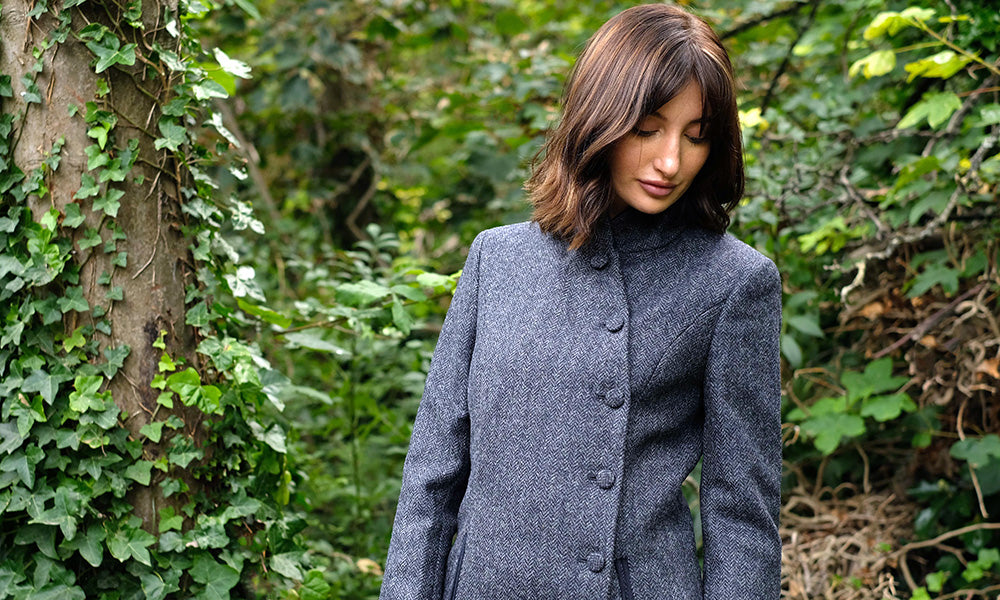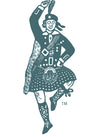Here at Highland Store we are big fans of wool. A quick look at our ranges of men’s and women’s kilts, men's and women's knitwear, scarves and blankets proves the point.
Wool is an amazing natural fibre and has been used to weave warm, water-repellent and durable textiles for thousands of years. It also has anti-microbial properties, can be dyed different colours easily, and is recyclable so it’s good for the planet too.
Everybody is familiar with lambswool but other animals also produce usable wool. Different wools have different characteristics and skilled textile weavers can use these to create everything from super soft shawls, knitwear to cosy wool blankets and hard wearing, stain-resistant carpets.
WHAT MAKES WOOL SO WONDERFUL?

Wool comes from animal fleece - usually lamb or sheep but wool can also be obtained from goats, alpacas and even rabbits. It is made of keratin, the same protein found in human hair. Wool yarn is made by spinning the fibres and then twisting two or more strands (or plys) together. This yarn is then used for weaving or knitting.
The surface of wool comprises a series of overlapping waxy cuticle cells which naturally repel water yet still allow water vapour to be absorbed. In fact, wool can absorb and release 50% more moisture vapour than cotton, and 30 times more than polyester.
This means that wool garments are shower proof and naturally stain resistant as spills don’t soak in easily. Wool clothing can retain or release heat and moisture allowing the body to remain comfortable whatever the weather.
And if that wasn’t enough, wool can also help to reduce sweating and lock away odours thanks to the natural anti-bacterial properties of lanolin.
MEASURING THE QUALITY OF WOOL

The most important measure of wool quality is the diameter of the wool fibre itself. This is measured in microns (1 micron = one millionth of a metre) using a microscope.
The softest, most expensive wool will have the smallest micron count. For instance, merino wool is normally in the range of 12-24 microns, much finer than human hair which comes in at 40-90 microns.
In general, wool measuring less than 25 microns will be used for garments and coarser grades will be made into outerwear or carpets.
Another important measure of wool quality is the crimp, which is the natural waviness of the fibre. This gives softness, springiness and elasticity. Crimp also helps to trap air between the fibres which creates better insulation.
The greater the crimp, the smaller the fibre diameter and the lower micron count. Fine merino wool for instance can have as many as 40 crimps per centimetre and this means that garments made with this type of wool often have superior drape than coarser wools.
DIFFERENCES BETWEEN VARIOUS TYPES OF WOOL
- Alpaca wool

Alpacas produce incredibly fine and soft wool ranging from 15-40 microns. However, only grades of less than 30 microns are used for clothing as larger fibres can be itchy. Alpaca fibres are not as elastic as other wools so are often blended with merino or cashmere to obtain a better drape.
At Highland Store, you’ll find 100% pure alpaca in our range of stylish stoles and blankets.
- Angora wool
Angora comes from the fine undercoat of the angora rabbit. With fibres measuring 10-15 microns, angora is incredibly soft but is not very strong. It is therefore often blended with more resilient wool fibres.
- Cashmere wool

Cashmere wool comes from the fine under-hair of cashmere goats. Cashmere knitwear is expensive because the finest wool (less than 19 microns) can only be gathered from the neck of the goat. It is combed rather than clipped and only small amounts are produced by each goat every year.
The fabulous warmth and softness of cashmere wool can be experienced with the tartan scarves in our Highland Store Cashmere Collection. These are made with 100% pure cashmere.
- Lambswool

Lambswool comes from the very first shearing of a sheep aged around seven months. It is fine and soft and doesn't need a lot of processing. Lambswool can be obtained from any breed of sheep so the fibre diameters vary. It is mostly used to make soft knitwear, scarves and blankets
You can feel for yourself just how soft lambswool can be with the Highland Store range of women’s lambswool fair isle sweaters and cosy pure new wool blankets.
- Merino wool

Merino wool is the finest and softest sheep’s wool and comes exclusively from the merino breed of sheep. This versatile wool comes in four grades – average (21.5 microns), fine (18.6-19.5 microns), superfine (15-18.5 microns), and ultrafine (less than 15 microns).
A high crimp count means that merino wool is excellent at wicking away moisture and regulating body temperature. This makes merino wool an ideal choice for high quality knitwear such as our women’s Aran Cardigans and Sweaters.
- Mohair wool
Mohair wool comes from angora goats (not to be confused with Angora rabbits) and is known for its fine, shiny yet strong fibres, which measure 25-40 microns. The slightly ‘frizzy’ appearance of mohair comes from mixing of guard hairs with the undercoat.
Mohair can be woven to produce soft, lightweight but very warm textiles and is used for high end knitwear. When blended with other wools mohair adds resilience and lustre.
- Shetland wool
Shetland wool, comes from a breed of sheep native to the Shetland Islands in Scotland and measures around 23 microns. It may not be as soft as merino wool, but Shetland wool is warm, lightweight and hard-wearing. Used in traditional knitted Highland clothing such as sweaters and scarves and also used to weave British tweeds.

HIGHLAND STORE WOOLLEN RANGE
We hope you’ve enjoyed reading about the incredible versatility and beauty of wonderful wool. Buying quality woollen goods such as traditional Scottish clothing is an investment. If cared for properly wool will last a long time. We have some advice on washing and caring for wool here.
Browse our collection of comforting Scottish tartan wool blankets, kilts, scarves and knitwear. Wool products make fantastic gifts – we have a great range of tartan wool ties, tams and berets, and gloves.



